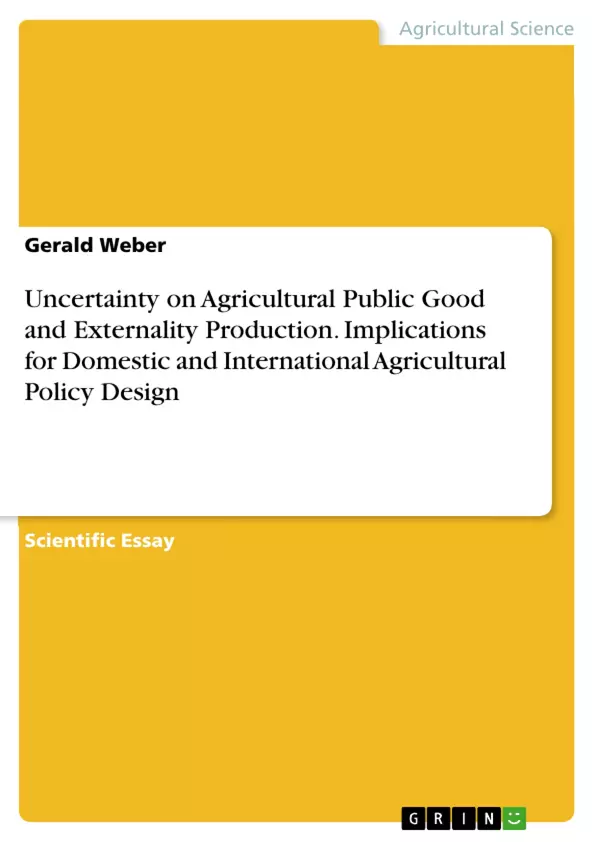This article deals with the consequences of uncertainties about the societal valuation of landscape benefits and environmental costs for multiple policy goal trade-offs that may result when internalising external benefits and costs by abolishing commodity subsidies, introducing land subsidies and intermediate input taxes. Numerical results of an illustrative model of the German agricultural sector are presented and trade-off curves for farm income, environmental cost reduction and landscape benefits are discussed. If the relevant criterion for policy decisions was a simple aggregation of the single policy goal indicators with constant weights, the optimality of policy options would be rather robust to valuation errors.
Expected exchange ratios between the different policy goals, however, can be severely distorted if policy-makers have wrong estimations of the true societal valuation of externalities. This may make targeted incentives that aim at a better orientation of agriculture towards societal demands appear too risky for policy-makers and finally leads to the blockage of policy changes. An appropriate policy portfolio should therefore comprise non-distorting compensations for negatively affected policy goals. The EU’s commitment in the WTO to multifunctional agriculture has to be underlined by effective domestic policy reforms, if this concept is not to be discredited as an attempt to justify disguised protectionism.
Inhaltsverzeichnis (Table of Contents)
- Summary
- Zusammenfassung
- Introduction
- Methodological approach
- The base version of MULTSIM - a reference for analysing uncertainty
- Valuation of externalities
- Policy scenarios
- Policy goal trade-offs
- Implications of uncertain knowledge on the societal valuation of public goods and externalities
- Conclusions for policy design
- Sources
- Annex
Zielsetzung und Themenschwerpunkte (Objectives and Key Themes)
This article investigates the consequences of uncertainty surrounding the societal valuation of landscape benefits and environmental costs for policy decisions regarding multifunctional agriculture. The study examines the impact of internalizing external benefits and costs through policy measures like abolishing commodity subsidies, introducing land subsidies, and intermediate input taxes. The article utilizes a numerical model of the German agricultural sector to illustrate potential trade-offs between farm income, environmental cost reduction, and landscape benefits.
- Valuation of externalities and public goods
- Multifunctional agriculture and policy design
- Trade-offs between economic and environmental objectives
- Implications of uncertain knowledge for policy decisions
- The role of modeling tools in policy advice
Zusammenfassung der Kapitel (Chapter Summaries)
- Introduction: This chapter outlines the importance of integrating valuation research into policy-decision support models. It highlights the complexities of multifunctional agriculture, particularly the co-existence of positive and negative externalities and their uncertain valuation. The chapter stresses the need for a multidisciplinary approach and the explicit addressing of uncertainties in policy advice.
- Methodological Approach: This chapter discusses the methodology employed in the study, focusing on the German agricultural supply model MULTSIM. It describes the model's structure, including its representation of commodity and non-commodity outputs, production factors, and farm types. The chapter also emphasizes the importance of selecting a modeling approach that balances comprehensiveness with ease of use for policy analysis.
- The base version of MULTSIM - a reference for analysing uncertainty: This section outlines the base version of the MULTSIM model, including its key parameters and assumptions. It details the policy scenarios used in the study, including the abolishment of commodity subsidies and the internalization of environmental costs and landscape benefits. This chapter provides a foundation for understanding the model's application in subsequent analysis.
Schlüsselwörter (Keywords)
This article centers on the evaluation of public goods and externalities generated by agriculture, highlighting the significance of incorporating empirical research into policy models. Key terms include environmental costs, landscape benefits, multifunctional agriculture, valuation of non-marketable outputs, uncertainty, agricultural sector modelling, and policy advice. The analysis investigates the implications of uncertainties in societal valuation for policy decisions, focusing on the potential for skewed trade-offs between economic and environmental objectives. This exploration emphasizes the need for robust policy strategies that account for uncertainties and mitigate risks associated with policy changes.
Frequently Asked Questions
What is the main focus of this article regarding agricultural policy?
The article investigates the consequences of uncertainty in the societal valuation of landscape benefits and environmental costs, specifically looking at how these uncertainties affect policy trade-offs in multifunctional agriculture.
Which modeling tool is used in the study?
The study utilizes a numerical model of the German agricultural sector called MULTSIM to illustrate potential trade-offs between farm income and environmental objectives.
What are the primary policy goals discussed in the model?
The primary policy goals include farm income, the reduction of environmental costs, and the production of landscape benefits.
How can valuation errors impact policy-making?
Wrong estimations of societal valuation can severely distort the expected exchange ratios between policy goals, potentially leading policy-makers to view targeted incentives as too risky, which can result in the blockage of necessary reforms.
What does the article suggest regarding the EU's commitment to the WTO?
The article states that the EU's commitment to multifunctional agriculture must be supported by effective domestic reforms to avoid being seen as disguised protectionism.
What policy measures are examined for internalizing external costs?
The study examines the abolishment of commodity subsidies, the introduction of land subsidies, and the implementation of intermediate input taxes.
- Citar trabajo
- Gerald Weber (Autor), 2003, Uncertainty on Agricultural Public Good and Externality Production. Implications for Domestic and International Agricultural Policy Design, Múnich, GRIN Verlag, https://www.grin.com/document/985991



